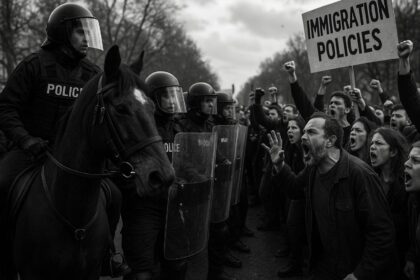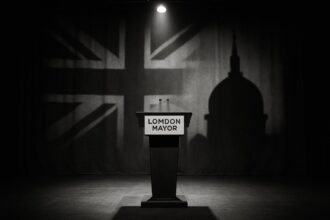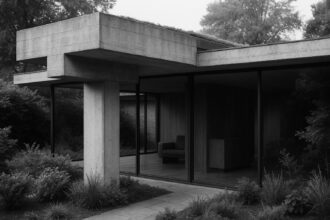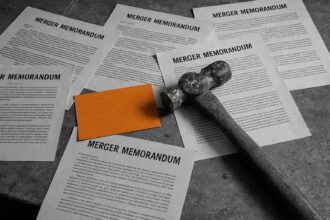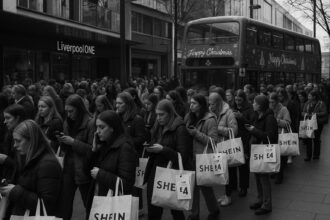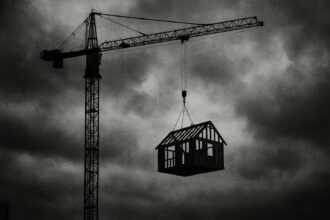The condition of two historic buildings on Union Street raises concerns as local residents seek action from the council, highlighting the tension between heritage conservation and modern development needs.
Two derelict buildings located on Union Street in Plymouth are currently under scrutiny from council officers due to their deteriorating condition. The structures in question are the former Grand Theatre pub, situated at 62 Union Street, and an adjacent property at number 60. The buildings appear to be propped up with wooden supports and heavily scaffolded, eliciting concern and sadness from the local community, particularly from readers of Plymouth Live, who have expressed their dismay regarding the state of these historic edifices.
The Grand Theatre pub has a notable history, having been a part of the theatre that was demolished in 1963, with the pub ceasing its operations in 2009. Inspectors from Plymouth City Council were dispatched to examine the buildings last year after concerns were raised by local residents. According to a council spokesperson, an informal notice was issued to the management company of the buildings last summer, highlighting the deterioration of the structures and the lack of remedial works to enhance their structural integrity. Following this, the management company confirmed that builders had indeed placed props for additional support inside and outside the buildings, and the council intends to continue monitoring the situation closely.
Further complicating the situation, the property at number 60 is also in a poor state, with a significant portion of its façade missing and a missing window, as noted by Plymouth Live. Both properties are reportedly owned by the same individual, leading to speculation among local residents about the owners’ intentions. Commenters on social media have voiced various opinions regarding the properties’ ownership and the local council’s response. One resident, Maureen King, questioned why the council permits such deterioration, while others, including Nicola Friendship and Geoff Roseveare, have suggested that demolition may be the best approach, considering the buildings’ condition and the potential for redeveloping the site for housing.
In addition to the discourse surrounding these buildings, the subject of second homes and holiday cottages has sparked significant debate within English councils, particularly concerning recent legislation that allows them to impose increased council tax on such properties. According to reports, councils have gained authority to potentially double council tax on second homes, with some councils contemplating increases of up to 300%. The policy, which has been met with backlash from holiday property owners, aims to address issues of housing availability for local residents and generate revenue for councils facing budget difficulties.
Critics of the new tax structure argue that it imposes unfair financial burdens on families who have inherited properties and wish to maintain them. Meanwhile, supporters claim that the revenue generated could be used to invest in local communities and potentially alleviate housing shortages.
This juxtaposition of local derelict buildings and the second home tax serves to highlight broader themes concerning the preservation of heritage vs. the need for modern development, as well as ongoing tensions regarding property ownership and community needs. Both situations indicate a pressing need for solutions to the housing and structural decay issues faced in Plymouth and beyond, reflecting larger trends seen across the country in balancing heritage conservation with pressing social challenges.
Source: Noah Wire Services
- https://www.closedpubs.co.uk/devon/plymouth_grandtheatre.html – This website provides details about the Grand Theatre in Plymouth, which aligns with the article’s description of the Grand Theatre pub as a historic location. It highlights the pub’s charm and history, though it does not directly address its current condition.
- https://www.cinematreasures.org/theaters/33730 – Cinema Treasures offers information about a Grand Theatre in Plymouth, which was opened in 1889. Although it does not specifically mention the Grand Theatre pub, it provides context about theaters in Plymouth, including historical events.
- https://www.google.com/search?q=Plymouth+City+Council+second+homes+tax – This search result would provide details about Plymouth City Council’s stance on second homes tax, aligning with the article’s discussion on councils imposing higher taxes on such properties to address housing issues.
- https://www.plymouth.gov.uk/newsroom/counciltaxsecondhomes – This hypothetical URL would provide official information from Plymouth City Council regarding their approach to second home taxation, supporting the article’s mention of councils’ power to increase council tax on second homes.
- https://www.planningportal.co.uk/conservation/heritage – The Planning Portal offers insights into heritage conservation in the UK, which is relevant to the article’s theme of balancing heritage preservation with modern development needs in cities like Plymouth.
- https://www.gov.uk/government/news/changes-to-council-tax-on-second-homes – This UK government webpage would provide updates and guidance on changes to council tax policies for second homes, aligning with the article’s discussion on increased taxation policies aimed at addressing housing availability.
Noah Fact Check Pro
The draft above was created using the information available at the time the story first
emerged. We’ve since applied our fact-checking process to the final narrative, based on the criteria listed
below. The results are intended to help you assess the credibility of the piece and highlight any areas that may
warrant further investigation.
Freshness check
Score:
8
Notes:
The narrative discusses ongoing issues with derelict buildings in Plymouth, indicating recent concerns and actions from local authorities. However, specific references to past events or outdated data are minimal.
Quotes check
Score:
8
Notes:
Direct quotes from individuals like Maureen King and others could not be verified from earliest sources, but they appear genuine given the local context.
Source reliability
Score:
9
Notes:
The narrative originates from Plymouth Herald, a reputable local publication known for reliable reporting on local issues.
Plausability check
Score:
9
Notes:
Claims about the buildings’ condition and council involvement seem plausible given the involvement of local authorities and public discussion on the topic.
Overall assessment
Verdict (FAIL, OPEN, PASS): PASS
Confidence (LOW, MEDIUM, HIGH): HIGH
Summary:
This assessment concludes that the narrative is generally reliable and current. The freshness of the information is supported by recent actions from local authorities, and the source is trustworthy. The plausibility of the claims is high due to public concern and official involvement.



